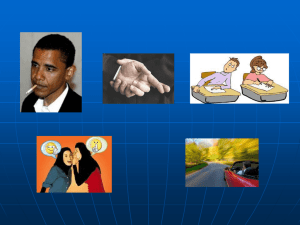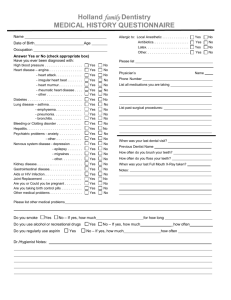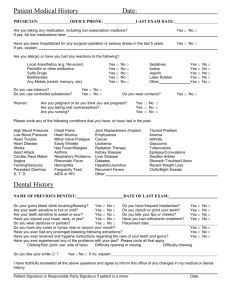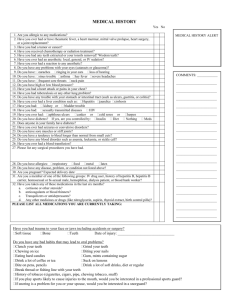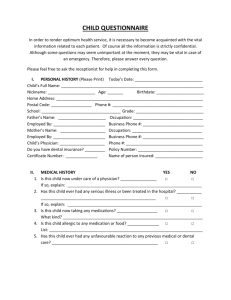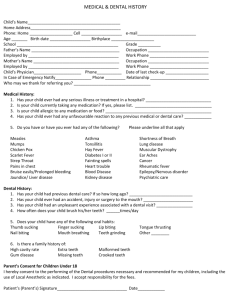Why fingers and thumbs shouldn't be sucked
advertisement
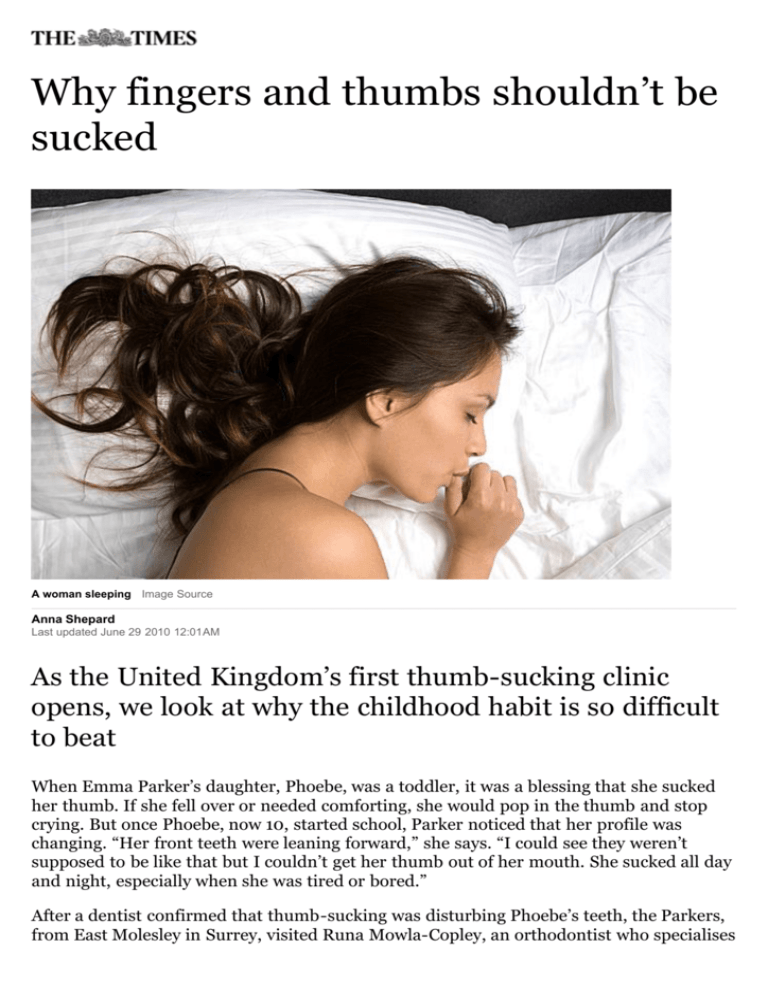
Why fingers and thumbs shouldn’t be sucked A woman sleeping Image Source Anna Shepard Last updated June 29 2010 12:01AM As the United Kingdom’s first thumb-sucking clinic opens, we look at why the childhood habit is so difficult to beat When Emma Parker’s daughter, Phoebe, was a toddler, it was a blessing that she sucked her thumb. If she fell over or needed comforting, she would pop in the thumb and stop crying. But once Phoebe, now 10, started school, Parker noticed that her profile was changing. “Her front teeth were leaning forward,” she says. “I could see they weren’t supposed to be like that but I couldn’t get her thumb out of her mouth. She sucked all day and night, especially when she was tired or bored.” After a dentist confirmed that thumb-sucking was disturbing Phoebe’s teeth, the Parkers, from East Molesley in Surrey, visited Runa Mowla-Copley, an orthodontist who specialises in children’s dental problems. Last week, Mowla-Copley and another orthodontist, Neil Counihan, opened Metamorphosis in West London, the UK’s first thumb-sucking clinic, which targets children whose teeth have become misaligned because they suck their thumbs or fingers. But why is the habit, often regarded as non-harmful and even quite endearing, sometimes so enduring? The clinic targets children and teenagers aged between 8 and 18 but also treats adults whose past thumb-sucking has left them with unsightly teeth. There are even a few adult thumb-suckers, who usually indulge in private. There is a thriving American website (thumbsuckingadults.com) for those in whom the habit has persisted, but adult thumb-suckers in the UK tend to provoke mingled amusement and disapproval — although more adults than you might imagine do maintain “comfort” habits from childhood. A straw poll among my friends revealed one 30-year-old thumb-sucker (only when she is tired or stressed, she says), as well as several nail-chewers and a man who strokes his pillow to get to sleep. The problem with thumb-sucking, says Counihan, is that it exerts great pressure in the mouth, causing or exacerbating dental problems. The characteristics of a current or former thumb-sucker are teeth pushed forward (“buck teeth”), bite problems — when the upper and lower stes of teeth don’t meet as they should — and a narrowed jaw. “Children’s bones are malleable, so the skeletal development of the mouth can be seriously affected,” he says. Front teeth that stick out are also more likely to break. But parents should not worry too soon. “Below the age of 6 there is no need to do anything — most children stop sucking their thumb before they start school, without damage to their teeth,” says Mowla-Copley. “It’s only a problem once adult teeth have come in. We wouldn’t consider treatment until then.” Persistent adult thumb-suckers, though, are unlikely to escape damaging their teeth. So what causes some people to persist with the childhood habit? “We call this a fixed action pattern — other examples would be nail-biting or hairtwiddling,” says Helen Nightingale, a clinical psychologist. “Although there is no research to suggest that it is genetic, from clinical experience I would expect that it is. I see patterns passed down in families. I once saw a three-week-old baby stroke her cheek in exactly the same way that her mother does.” Thumb-sucking is common because sucking is the first reflex that we learn. It is a survival instinct, developed in the womb, that enables us to search for our mother’s nipple. Most people gradually forget the reflex. In the past it was assumed that older children and adults who still sucked their thumbs were victims of inadequate nurturing. Claudia Herbert, a clinical psychologist, gives some credence to this, although she adds that the explanation would account for only a minority of thumb-suckers. “If a young child goes through something stressful, then sucking can become a soothing strategy,” she says. “It then prompts the brain to release endorphins, which make the child feel good, and turns the habit into something resembling an addiction.” Until last year, 29-year-old Jessica Simmons, a fashion buyer from Reading, was a fingersucker. To relax or get to sleep she sucked the end of her right index finger. It was the best thing after a long day at work, she says. “I’d go home, sit on the sofa and zone out with my finger in my mouth.” The habit began when she was 4, at the time when her parents were splitting up, which she is sure was the cause. “As a teenager I was embarrassed to do it in public,” she says, “but it was weird explaining it to my boyfriend, who I met at 20.” Simmons might have carried on, had she not realised that the habit was damaging one of her front teeth, which was stunted by continual pressure from her finger. “I was paranoid that people were always looking at my small tooth,” she says. “I started covering my mouth with my hand when I laughed.” After a dentist told her that a brace would be pointless until she kicked the habit, she decided to take action. Having read about hypnotherapy, Simmons booked an appointment with Sandra Trebinski, who practises in Windsor (thehypnotherapycentre.co.uk). That was all it took. Afterwards, she stopped immediately. “I’d been anxious about not being able to sleep,” she says. “The first night it took me an hour to drop off; apart from that it was easy.” At the West London thumb-sucking clinic, prevention strategies rely on giving patients a firm talking-to, and then, if necessary, fitting a physical barrier between thumb and mouth. Counihan stresses the importance of waiting until someone is ready to give up the habit. “It has to be a conscious decision,” he says. “By the age of 8 or 9, most children want to stop.” For stubborn cases there is a habit-breaking appliance that is fixed in the mouth. It cannot normally be seen but prevents the wearer from getting purchase on the thumb. “Three months of wearing it is usually enough,” says Counihan. There are also thumbguards or finger-guards for wearing at night. Apart from causing dental problems, should adult thumb-sucking be seen as a problem? Nightingale believes generally not, especially as other habits (smoking, for example) are much more damaging. She also points out that childhood habits often develop into socially acceptable adult ones. “An adult won’t carry around a fluffy blanket but may take a mascot to work, such as a family picture,” she says. After a talk from Mona Copley, Phoebe’s teeth have now been encouraged into perfect symmetry. As for Simmons, the outcome was even better. After she stopped sucking her finger, her stunted tooth began to descend almost immediately, with no need for a brace. Contact us | Terms and Conditions | Privacy Policy | Site Map | FAQ | Syndication | Advertising © Times Newspapers Ltd 2010 Registered in England No. 894646 Registered office: 1 Virginia Street, London, E98 1XY
